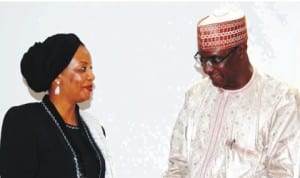Business
NLC Criticises NERC Over Tariff Increase

Acting Executive Secretary, National Investment Promotion Council, Alhaji Hassan Abubakar (right), handing over to his successor, Mrs Salamatu Umar, in Abuja, recently. Photo: NAN
The Nigeria Labour Con
gress (NLC) has called on the Nigerian Electricity Regulatory Commission (NERC) to ensure improved electricity in the country before contemplating any increase in tariff.
The NLC President, Alhaji Abdulwaheed Omar, made this known at a stakeholders meeting organised by NERC in Abuja last Tuesday.
Omar, who decried the recent increase in electricity tariff by NERC, criticised the commission for not consulting with consumers and stakeholders like NLC before announcing the increment.
The commission had announced a marginal increase of about one naira in energy charge for consumers while it retained N750 monthly fixed charge with effect from June 1.
NERC had explained during its Multi Year Tariff Order (MYTO) meeting in May that the Energy Cost (EC) had to be slightly jerked up.
It said the increment was due to what it described as high distribution cost over a low energy generation capacity.
Omar, however, insisted that NLC and other stakeholders ought to have been called to a round table on the issue before the announcement and not after the announcement was made.
“It is not very good to have this kind of arrangement where the interaction is after the deed has been done.
“It is better you do all the consultations so that people are better informed about what they expect and why you are doing what you are doing,’’ he said.
Omar stressed the need for improved power supply before any tariff was increased so that Nigerians are not made to suffer double jeopardy.
“The rate of tariff increase is quite worrisome and there is no proportionate increase in electricity supply.
“The amount of consumption should determine the rate paid by consumers, what Nigerian consumers expect is an improvement in power supply, but what they get in return is a hike on electricity tariff,” he said.
Omar charged NERC to be more proactive and match the projected increased accessibility with affordability as Nigerians were tired of excuses from the regulatory body and the Distribution Companies (DISCOS).
He urged NERC to investigate the activities of (DISCOs), which according to him, bill customers based on estimation and not on adequate metering system made available by the regulatory body.
“It is one thing to announce tariff rate without the capacity to enforce it.
“The social service component of electricity must not be laid down for profit maximisation because the consumers are always at the receiving end,” Omar said.
Earlier, NERC Chairman, Dr Sam Amadi, said the commission had to organise the stakeholders meeting to get the right feedback for all stakeholders.
Amadi said NERC did a lot of consultations with stakeholders such as the CBN, National Bureau of Statistics (NBS) on the macroeconomics before the reviewed tariff was announced.
“The kind of feedback you are giving us now is the reason we want to hear from you.
Business
NCDMB, Jake Riley Empower 250 Youths On Vocational Skills

Transport
Nigeria Rates 7th For Visa Application To France —–Schengen Visa

Transport
West Zone Aviation: Adibade Olaleye Sets For NANTA President

-

 Business4 hours ago
Business4 hours agoNCDMB, Jake Riley Empower 250 Youths On Vocational Skills
-

 Oil & Energy5 hours ago
Oil & Energy5 hours agoNNPCL Unveils Gas Master Plan 2026 …….Targets 10bcf/day production
-

 News6 hours ago
News6 hours agoGovs Move To Prioritise Sugar For Industrial Growth
-

 Politics3 hours ago
Politics3 hours agoPFN Rejects Call For INEC Chairman’s Removal Over Genocide Comments
-

 Sports5 hours ago
Sports5 hours agoEkitike Stars As Liverpool Upstage Newcastle
-

 Niger Delta4 hours ago
Niger Delta4 hours agoPDP Declares Edo Airline’s Plan As Misplaced Priority
-

 News6 hours ago
News6 hours agoLand ownership disputes are civil matters, not police cases – FCID
-

 Environment4 hours ago
Environment4 hours agoNigeria, UAE to waive tariffs on some products

